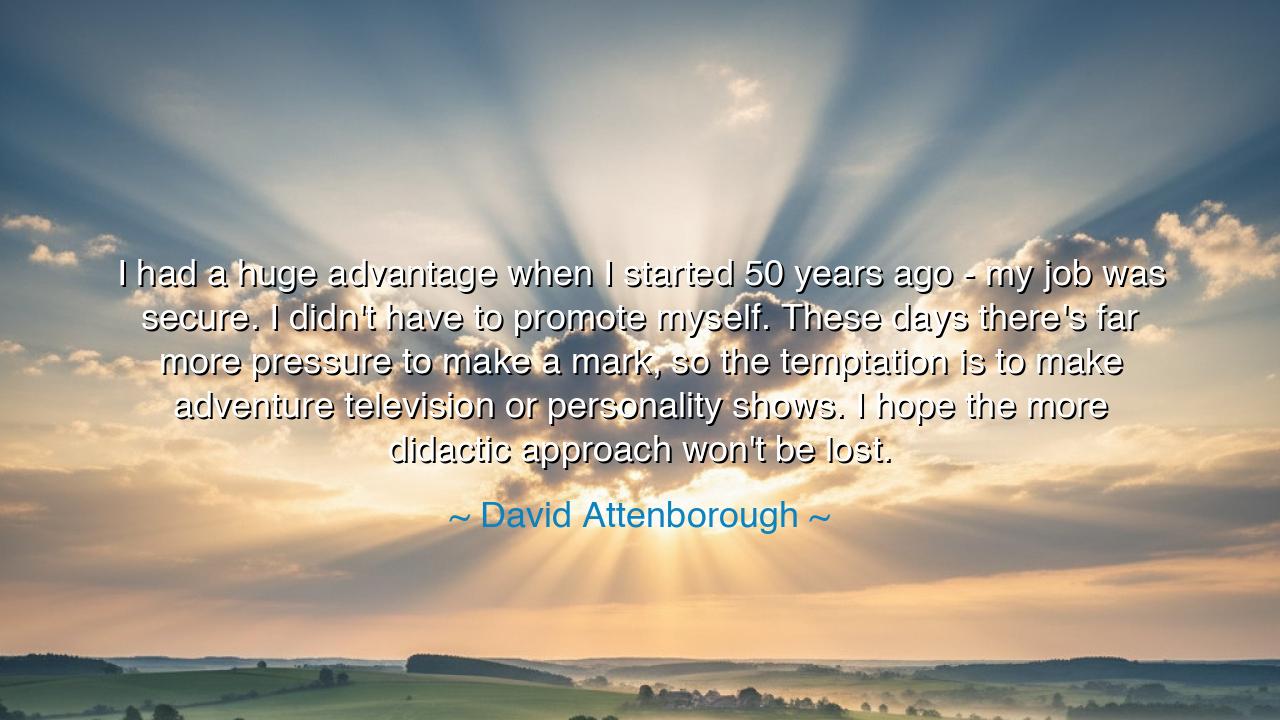
I had a huge advantage when I started 50 years ago - my job was
I had a huge advantage when I started 50 years ago - my job was secure. I didn't have to promote myself. These days there's far more pressure to make a mark, so the temptation is to make adventure television or personality shows. I hope the more didactic approach won't be lost.






“I had a huge advantage when I started 50 years ago — my job was secure. I didn’t have to promote myself. These days there’s far more pressure to make a mark, so the temptation is to make adventure television or personality shows. I hope the more didactic approach won’t be lost.” — thus spoke Sir David Attenborough, the great chronicler of the living earth, whose voice has carried the wonders of creation into every corner of the world. In this reflection, spoken with his characteristic humility, lies a warning as gentle as it is profound. He speaks not only of his craft but of an age — the shift from a world that revered knowledge to one that worships visibility, from a time when truth stood tall on its own to a time when truth must compete with spectacle. His lament is not for himself, but for the future — for the integrity of understanding in an age of noise.
The origin of this quote reaches back into the long journey of Attenborough’s life — a life devoted to learning, observing, and teaching. When he began his career with the BBC in the early 1950s, television itself was young, and its purpose was still being discovered. He entered not as a celebrity, but as a student of the world, a man whose mission was to unveil the mysteries of nature to those who had never seen beyond their towns or fields. He had, as he said, “a secure job” — meaning not merely financial stability, but the freedom to explore truth without pandering to the crowd. The camera, then, was a window to knowledge; now, too often, it has become a mirror for the self.
When he speaks of the “temptation to make adventure television or personality shows,” Attenborough warns of a slow corruption — not of evil intent, but of distraction. The pursuit of fame, of likes and followers, has crept even into the noble realm of education. Where once the scholar sought to illuminate, now many are tempted to perform. Where once the explorer sought to reveal the world, now he is urged to reveal himself. And yet, Attenborough reminds us that the true mission of knowledge is not entertainment, but enlightenment — not to astonish the senses, but to awaken the mind.
The didactic approach — teaching for the sake of understanding — is the method of the ancients, the pathway of all civilization. It was how Aristotle taught under the olive trees of Athens, how Confucius guided his disciples through questions rather than spectacle, how Galileo, through patient observation, brought light to a world darkened by superstition. In every age, the teachers who shaped the soul of humanity were not those who sought attention, but those who sought truth. Attenborough’s fear, spoken softly, is that this sacred lineage may be broken — that in our rush to be seen, we may forget how to see.
Consider, for example, the great voyager Charles Darwin, who traveled the seas not to entertain, but to understand. His voyage on the Beagle was not one of grandeur, but of quiet observation — the slow gathering of insight through humility before nature. He returned not as a conqueror of the unknown, but as a servant of knowledge. His discovery of evolution changed the course of human thought, not because he was loud, but because he was faithful to truth. This is what Attenborough upholds — the idea that true discovery requires patience, curiosity, and respect for the mystery of life, not the glare of fame or the roar of applause.
And yet, Attenborough’s lament is not one of despair. Beneath it lies hope — hope that there will always be those who choose the slower, truer path, who will protect the spirit of inquiry from the corrosion of vanity. For though the world clamors for excitement, the human heart still hungers for meaning. The more superficial the age becomes, the more precious are those who dare to teach, to observe, to listen. Attenborough’s life itself is proof that a humble voice, speaking truth with devotion, can reach further and endure longer than the loudest shout.
So, my child, let this be the lesson: seek not to make a mark, but to make a difference. Do not chase attention; chase understanding. When you create, do it not to be admired, but to illuminate. In a world that rewards noise, be the stillness that others may hear clearly. Guard the didactic spirit, the sacred art of passing down wisdom without adornment. Remember that truth does not need to glitter to be beautiful — it shines by its own light.
For as David Attenborough reminds us, the greatest teachers are not those who stand in the spotlight, but those who hold the lantern high for others to see. The world will always need its explorers, its storytellers, and its seekers of wonder — but above all, it will need those who love knowledge more than praise. Be among them. For the mark left by truth is deeper and more enduring than any ever carved by fame.






AAdministratorAdministrator
Welcome, honored guests. Please leave a comment, we will respond soon